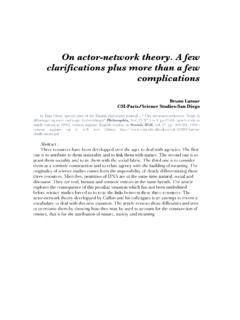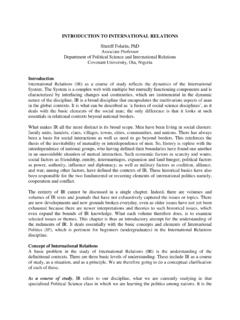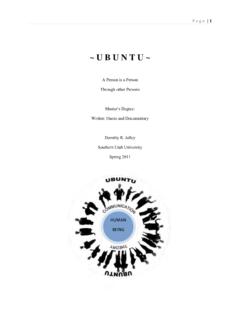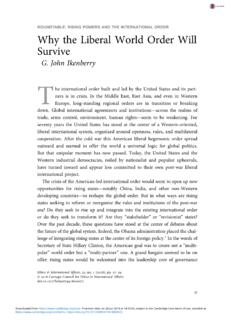Transcription of The Age of Absolutism - bildung-rp.de
1 The Age of Absolutism (17 18th Century)Abstract Absolute monarchy or Absolutism meant that the sovereign* power or ultimate authority in the state rested in the hands of a king who claimed to rule by divine right. (Jackson J. Spielvogel. Western Civilization, St. Paul, 1991, p. 523)IntroductionThe Age of AbsolutismAbsolutism* is a term used by historians to describe a form of monarchical power that is unlimited by any other institution, such as the church, parliament, or social elites. The absolute monarch exercises* ultimate authority over the state and his subjects, as both head of state* and head of government.* In an absolute monarchy there is no constitution or legal restriction on the monarch's power. Absolute monarchy is normally hereditary* or passed on through term Absolutism is typically used in combination with some European monarchs during the transition from Feudalism* to early Capitalism*, and monarchs described as absolute can especially be found in the 17th century through the 18th century.
2 The Age of Absolutism is usually thought to begin with the reign of Louis XIV (1643 1715) and ends with the French Revolution (1789).European Religious Conflicts of the 16th and 17th CenturiesAbsolutism was primarily motivated by the crises of the sixteenth and seventeenth centuries. The Protestant Re formation (1517 1648) had led to a series of violent and bloody wars of religion, in the course of which thou sands of innocents met their deaths. The population in the German states, for instance, was reduced by about 15% to 30% in the Thirty Years War* (1618 48) whereas the population of France, at between 16 to 18 million people in 1600, fell by 2 to 4 million during the French Wars of Religion* (1562 98). Similar wars took place in Switzerland, Austria, Bohemia, the Netherlands, England, Scotland, Ireland and because of the religious wars, but also due to a growing secularization,* religion was losing its grip on Europe.
3 Inspired by the Renaissance and in particular by the Scientific Revolution, intellectuals took to think ing outside the boundaries of church ideology; and since changes in the economy were noticeably increasing the prosperity* of many Europeans, European society became more and more this context, absolute monarchies were regarded as the solution to these violent disorders, and Europeans were more than willing to have local autonomy* or political rights taken away in exchange for peace and of Feudalism and Origin of the Early Modern State At the end of the Middle Ages, Feudalism declined. While the old feudal system had been defined by a weak monarchy attempting to control the lands of the realm* through mutual agreements with regional leaders of the nobility, the modern age was characterized by a rise of the king s power in some parts of Europe.
4 These kings were soon to become absolute monarchs with a much greater power over the nobles and the common people. Thus historians generally regard the growth of the absolute monarchy as the origin of the modern state. Most of the characteristic features of the modern state were more or less instituted* in the France of Louis XIV and other contemporary* monarchies in Europe (see below).As for the economy, the decline of the feudal order also gave rise to the earliest forms of Capitalism. In most European nations through the 1800s, the established guild* system was dissolved and replaced by the idea of 51015202530free trade ( an economic system in which goods and capital are traded in markets and profits distributed to owners).An intermediate step on the way to early Capitalism was, for many nations, an economic system called Mer cantilism* that helped absolutist rulers to centralize the economy.
5 Mercantile theory claimed that the prosperity of a nation was dependent upon its supply of capital, which was best increased through a positive balance of trade* with other nations. The ruling government should advance this goal by encouraging exports and discour aging imports, notably through the use of tariffs* and subsidies*. In return, the taxes paid by the merchants would help to fill the treasury* and thus give the monarchs the financial power they were looking for. Take, for example, projects like Versailles: the amount spent on Louis XIV s royal palace is estimated at ca. billion (!) of Absolute RuleIn order to achieve eagerly awaited stability after long years of war (see above), absolutists made sure that the key elements of national government would be solely placed into the hands of the monarch: the armed forces, tax collection, and the judicial* system.
6 These were powers normally enjoyed by the local nobility in their territor ies; the national administration of these functions, however, required the formation of a nationwide bureaucracy* whose officials were answerable to the king alone. Consequently, this new type of bureaucracy had to make a stand against the most powerful institutional forces opposed to the king: the nobility, the church, legislative* bodies (parliaments), and regions which had been autonomous until then. In order to centralize the administration of the state, the absolute ruler had to some way or other take political authority out of the hands of the nobles who had no desire whatever to give that au thority up! On the whole, European kings were successful in crushing any kind of aristocratic resistance, with the exception of the Stuarts in England who were defeated in their campaign for absolute rule (see below) and the Polish kings who had to accept a nobles from the rise of professional bureaucracies, absolute states featured a national legislation*, a national jurisdiction,* a large, standing military under the direct control of the king, and a national tax collection mechan ism in which taxes went straight to the national government (i.)
7 E. the king s treasury) rather than passing through the hands of the local monarchs spent exorbitant sums on warfare and extravagant buildings, such as the Palace of Ver sailles (see above), for themselves and the nobility. They often required the nobles to live at court for some time, while state officials ruled their lands in their absence. Behind this was the idea to reduce the effective power of the nobility by making them become reliant upon the munificence* of the of Royal AbsolutismAbsolute monarchies often gave birth to ideologies that eloquently justified the power exercised by the absolutist monarch. Political and religious doctrines* of royal Absolutism were either based on the Divine Right of Kings* or a variation of the Social Contract* Right of KingsThe Divine Right of Kings states that a monarch is subject to no earthly authority since he derives the right to rule directly from God.
8 As a consequence, he is not subject to the will of his people, the clergy or the nobility. The Divine Right of Kings implies that whoever might attempt to remove the king from his office or restrict his powers runs contrary to the will of God and thus commits heresy.*The first author to come forward with this theory was Jean Bodin (1530 1596), a French professor of law and political philosopher, who based it on his interpretation of Roman law. He defined sovereignty* as the abso 5101520253035lute and perpetual power and emphasized that the sovereign prince [..] is only accountable to God (Six Books of the Commonwealth, 1576).In England the same theory surfaced under the reign of King James I of England (1603 25). In the book The True Law of Free Monarchies (1598), James categorically proclaimed his own ideas of kingship, explaining that for biblical reasons kings are higher beings than other men: "Kings are called gods [.]
9 ] because they sit upon God His throne in earth . This special status allows them to impose new laws by royal prerogative* (that is without consulting Parliament). However, this does not mean that kings use their powers arbitarily; James read ing of The True Law of Free Monarchies allowed that a good king will frame all his actions to be according to the law, yet is he not bound thereto but of his good will. During the reign of King Louis XIV of France, the theory of divine right was strongly promoted by the French bishop and theologian Jacques B nigne Bossuet (1627 1704). Court preacher to Louis XIV, Bossuet was a strong advocate of political Absolutism . When chosen to be the tutor of the Dauphin,* oldest child of Louis XIV, he wrote several works intended as schoolbooks, one of which was Politics Derived from the Words of Holy Scripture, published posthumously in states that God establishes kings as his ministers, and reigns through them over the people ; at the same time he stresses that the prince must be obeyed on principle, as a matter of religion and of conscience , which practically makes the king a sacred* person.
10 Although he declares the absolute authority of rulers, Bossuet underlines the fact that the king is not above the law, for if he sins, he destroys the laws by his example. The theory of divine right disappeared in England after the Glorious Revolution of 1688. The American (1776) and French (1789) Revolutions further weakened its appeal, and by the early twentieth century, it was given up Contract TheoryThe idea of the social contract is based on a reciprocal* agreement: the people transfer some of their rights to a government or ruler in order to receive social order and peace through the rule of law. The first modern philosopher to articulate this kind of theory was Thomas Hobbes (1588 1679). In his book Leviathan (1651), Hobbes argues for a social contract and rule by an absolute monarch. According to Hobbes, life without a strong central government would lead to chaos and civil war (bellum omnium contra omnes, the war of all against all ) since, in this state of nature , each person has the natural right to everything.







